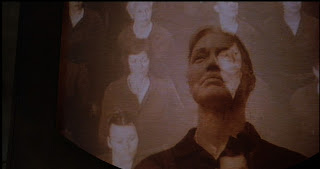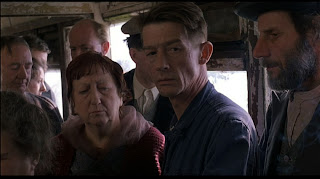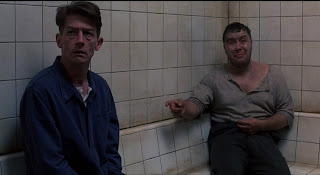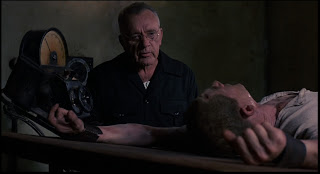I still intend on doing a post on Ken Russell’s Lisztomania since it is (much) less a “biography” of Franz Liszt than about the struggle between “good” and “evil,” the latter personified by the Nazis’ favorite composer, Richard Wagner. But there is so much going on in that film that I have to find a way to edit through almost 300 screen caps. In the meantime, while it may seem a cliché, it is still worth discussing Vladimir’s Putin’s Russia in relation to George Orwell’s 1984. There is some debate whether 1984 was about Nazi Germany or communist Soviet Union, but there are enough elements of both of those societies to fit in the book’s narrative.
We are hearing, for example, stories such as a man living in Ukraine wondering why his family in Russia has not called him to find out if he is alright amongst all the destruction and death. He was shocked to hear his father angrily insist that what his son was telling him was all “lies,” and he actually believed the propaganda by Putin and Russian media that Russian soldiers are only there to “assist” Ukrainian civilians. The conversation ended in a shouting match, the son in disbelief of the level of misinformation and ignorance he was hearing from his father.
We are told that polling suggests that nearly 70 percent of Russians also support Putin’s actions and believe the sanitized images and reporting they are receiving from Russia’s censured media. We see Russians displaying the letter “Z” imagery indicating their support for the war, and mostly younger, more social media savvy Russians confess that they know the truth of what is happening, but they can do “nothing”—even to speak out against it—out of fear of the regime.
Putin has been telling Russians the outrageous lie that the military “operation” is only after certain Ukrainian government officials, to “denazify” a country whose current president is Jewish, completely ignoring the fact that ordinary Ukrainian civilians have also taken up arms against the Russian invaders. As we will see in the film 1984 starring John Hurt and Richard Burton, we are presented with this statement on how this kind of twisting of the past is supposed to work:
We then see the mind-controlled masses of Oceania watching the latest propaganda film, suggesting the idea that people are the “land,” not too far off from the Nazis’ “blood and soil” ideology. Note that the Party’s “INGSOC” banner shows a white hand shaking a black hand; this is obviously meant to expose the hypocrisy of this society, since there are no nonwhite people to be seen anywhere, and it will soon become clear that racism is one element to keep the people in line.
Scenes of “peaceful,” freedom-loving workers are soon replaced by scenes of war and destruction, supposedly caused by the “dark armies” of “Eurasia.”
During the course of the film we never encounter any character who actually has experienced this “war,” but they have been programmed to believe it is happening, and not questioning how it is being reported seems to change from time to time. Next we see “Goldstein” on the screen, obviously meant to be a dastardly Jew and the leader of the rebel organization “The Brotherhood,” said to be responsible for all of this, with his “lies” about how the there is no real war going on with Eurasia, that the leaders of Oceania are engaging in apparent “false flag” operations dropping bombs on their own people, and that it is the Party, not Eurasia, that is the real enemy. The people must throw off the yoke of oppression or become “stupid slaves” of the Party, and they have nothing to lose and everything to gain by doing so.
However, his words are drowned out by shouts of “traitor” by the mindless throng, especially by a woman named Julia (Suzanna Hamilton):
Her over-exertions attract the suspicious attention of inner Party member O’Brien (Burton)…
…and that of Winston (Hurt):
Under the watchful eye of “Big Brother”...
...the Party leader—Winston works in an information bureau where he receives bulletins informing him to alter previous “news” to “erase” out-of-favor persons or “update” production figures. Here the latest information update informs him that something needs to be changed because of a “misquote”…
,,,the promise of no reduction of chocolate rations below 30 grams is now to be called an “increase” from 20 to 25 grams…
…and the offending newspaper article is put in the incinerator:
Winston arrives home after work, where the television is still on, since only inner Party members are allowed to turn it off. The latest news (there never seems to be any “entertainment” programming) is about a man who became “mentally unbalanced” from the Atomic Wars and allowed himself to come under the influence of Goldstein, which in turn caused him to engage in all manner of anti-social behavior, perversions and assassination plots against Party leaders:
Winston, however, is what is called a “thought criminal.” Hidden from view of the television screen, he hides a journal which he occasionally scribbles some random thoughts:
Otherwise, his every move is monitored, such as here when he is personally singled out for not performing his exercises “correctly”:
Winston encounters his neighbor and coworker, Parsons, who thinks it is “jolly good” about the news that the chocolate ration has been raised from 20 to 25 grams:
While a loudspeaker announces impossibly high increases in production numbers that have little relation to the quality of life of these people, here another coworker wants to know if Winston has an extra shaving razor to lend him; Winston admits he has been using the only one he has for the past six weeks:
Sitting at a table having their noon “meal” of soup with a protein substitute and cup of what one suspects is vodka, the discussions centers around the new “dictionary,” which will reduce the number of allowable words to fit into a volume not more than an inch thick, and the fact that the protein substitute in their soup looks and tastes like “meat,” but isn’t meat at all; if Parsons is being sarcastic, this probably constitutes a “thought crime.” Meanwhile Julia seems to have taken an interest in Winston, which he takes to mean suspicion of him as a thought criminal, given her own apparent Party fanaticism:
Back home, the television screen shows viewers what can happen to people who don’t think in the correct way…
…while Winston writes in his journal “seditious” thoughts and how to evade patrols into the part of town where the “proles” live. The proles are working class outcasts, but they manage to live in a kind of freedom that attracts Winston. He muses that if they were conscious of their own strength, they could overthrow the Party. He recalls going to the forbidden area where the proles live, and encountering a prostitute who had seen better days, went ahead with it merely because it was a taste of “freedom” and human "feeling."
At work, Winston goes about the business of “adjusting” information, such as the ostracizing of a former inner Party member who used his position as “minister of peace” to “conspire” with Eastasia. Later he encounters the man in what passes for a café, and is seen on the big screen confessng to a variety of crimes and perverted behavior he was likely tortured into admitting to. Winston then sneaks away into the proles’ side of town, where he sees people enjoying themselves in a pub…
…and even showing affection in public:
He then goes to a shop selling mostly worthless knick-knacks, but he pays $4 for a paperweight containing a piece of coral because it is what passes for “beauty” in his part of town:
The shopkeeper seems think that Winston might be interested in renting a bedroom upstairs, a much nicer abode than his own, but now currently unused since the proprietor’s wife died (or so he claims). Winston is shown the room; on the wall is a sketch of what appears to be a church, but this is no ordinary picture, as we will discover later.
Back home, on the television screen there is a news flash celebrating the fifty percent decrease in civil marriages, Party women of the “Anti-Sex League” taking a “vow of celibacy” and becoming “vessels” for artificial insemination, the eradication of sex and the triumph of will power over the orgasm:
For some reason this arouses a memory from his youth, as he gazes upon the body of his dead mother, apparently about to be devoured by rats:
That night he encounters Julia alone on the street, who he fears may denounce him as a thought criminal; she is wearing the red belt of the Anti-Sex League. She appears to have an injured arm, and falls down. Winston offers to help her up, and she offers her hand; she insists she is alright…
…but after they part, Winston observes what the scrap of paper she put in his hand says:
"Love," of course, is reserved only for the Party, not for other people. Later, Winston assists Parsons’ wife in unclogging a drain while her Hitler Youth boy stares evilly at him, telling Winston that he thinks he is a “thought criminal”:
Then on a dilapidated train…
…mind-controlled children in uniform sing of the “future”…
…that the older generation fears and wants no part of:
Off the train and wandering into a wooded area, Winston is joined by Julia, who admits that she has been here frequently to have sexual relations “hundreds of times.” Winston admits he is “corrupt,” and Julia claims that she should suit him then, because she is corrupt “to the core”:
Winston returns to the shop in the proles’ section of town and pays rent for the bedroom. At another rally, like Julia he overdoes the fanaticism:
Winston and Julia have a tryst in the bedroom; she removes her drab uniform and puts on a dress, which she probably obtained from a "prole" shop:
Back at work, Winston is being told to “remove” a coworker:
Later, Winston is detained by O’Brien, who offers to show him the new edition of the Newspeak dictionary:
Winston and Julia are in bed. They wonder how long their luck will last before they are caught:
On his way back home, there is an explosion. At work, Winston is instructed to report that Eastasia is responsible. Oceania has always been at war with Eastasia. People are now to be told that Eurasia is their “friend,” and always has been:
In the bedroom with Julia, Winston feels shame with the memory of stealing a piece of chocolate out of his sister’s hand…
…and after running away for a few hours, returns to the ravaged house now only occupied by rats, which will have meaning later:
Winston visits O’Brien in his huge office, is offered a glass of wine, and is shocked when O’Brien turns off Big Brother; that is a privilege of inner Party members:
O’Brien tells Winston that the danger posed by “thought criminals” is real. Although they cannot act collectively, individually they spread moral corruption and disease “in the name of spreading knowledge from generation to generation”:
After giving Winston the new Newspeak volume, the television news reports a new “outrage,” with 4,000 Oceanians allegedly killed by an attack by Eastasia. “Death to the enemies of Oceania—Death! Death! Death!”:
Winston discovers that the book he was given by O’Brien has hidden pages:
Winston reads “In accordance with the principles of Doublethink, it does not
matter if the war is real or not, or when it is, victory is not possible. War
is not meant to be won, it is meant to be continuous…a hierarchal society is
only possible on the basis of poverty and ignorance…the war is waged by the
ruling group against its own subjects, and its object is not victory over
Eastasia and Eurasia, but to keep the very structure of society intact.” In the bedroom
with Julia he hears a prole woman hanging clothing on a line outside, singing a
song of human feeling from long ago that still lingers in her memory.
The future is hers, Winston says, but “we are the dead.” At that moment the picture of the church falls to the floor, revealing a small television screen. They have been monitored the entire time by the thought police, and the shopkeeper was actually a police inspector. “You are the dead,” the voice on the screen tells them:
The thought police arrive to arrest them:
Winston is joined in a cell with Parsons, who is “proud” that his children “found him out” and turned him in, even though he isn’t sure what he did. But when “Big Brother” appears on the screen he fears he is going to be shot and insists that Winston is the real “criminal” and he is the one they want:
After Parsons is taken away, O’Brien arrives. He is accompanied by two thought police, which makes Winston believe he has been arrested as well. O’Brien admits that he was arrested, but it was a long time ago. Winston should have known he would be found out, and photographs of his love-making with Julia would be “recycled” for proletarian use:
Winston is tortured and his hair is cut off to make him look like a concentration camp inmate…
…and tortured again, to “cure” him, which means for him to accept that everything he thinks is the truth is wrong:
But Winston has the tenacity to say that people and information he had known could not be completely erased because they would remain alive in his memory, that the Party cannot change two plus two equals four. This is good for more electric shock treatment; O’Brien insists that he must accept that the truth is whatever the Party tells him it is:
O’Brien cryptically tells Winston that he won’t be killed as long as there is some part of him that resists the Party; it is only when he is no longer of any use as a propaganda tool will he be killed. He tells Winston that Julia betrayed him instantly, and this demonstrated that she wasn’t really committed to the “idea” in the first place. The session continues with O’Brien telling him than one man asserts power over another by making him suffer, because obedience is not enough. Power is inflicting pain and humiliation. Power is tearing human minds apart, and putting them back together in way of your own choosing. There is no love save love for the Party and Big Brother; anything that competes with that must be destroyed.
Winston musters one last gasp of humanity, insisting that the Party cannot completely stamp out the “spirit of man,” but O’Brien suggests that he is not a “man,” or if he thinks he is, he is the last man on earth, or at least in Oceania. The individual is dead, easily erased from memory and history. Only the Party lives.
Winston is taken to Room 101, where he is to come face to face with what he fears the most—rats, like the ones he remembered from his youth. A cage is enclosed around his face, and a rat is released in it. All resistance failing him, he at last betrays Julia:
The film ends with Winston sitting in a bar before a chess board, his “confession” being aired on the big screen, most of it lies. He is visited by Julia, who appears to be completely lifeless now:
After she leaves, Winston listens to himself confessing that he wants to be shot while his mind is still clean. Is it? We see him writing “2 +2 =” in the dust on the table but does not finish the equation:
Then news of a military success against Eurasia (not Eastasia), a war which is likely a “false flag” event—if it is happening at all—but everyone’s mind has been programmed to believe anything the Party says. He turns away from the screen with tears in his eyes. He still remembers:
The Germans were able to learn—with the help of the Allied occupation forces—the lessons of World War II well. If a totalitarian dictatorship like Germany could develop and evolve into a successful, prosperous democratic country, why couldn’t Russia when it had the chance? Is there some kind of psychological problem that holds Russians back? Don’t they know that in order for their “quality of life” to equal that of Germany, it had to get over their “master race” shtick? But Russians seem to believe that they must either be a “superpower” based on little more than their land mass and nuclear weaponry, or nothing.
People who live in a prosperous society do not seek war—only their leaders do at their own peril; it is impoverished societies whose ruling class seeks to maintain power by manufacturing enemies to serve as the focus of societal anger, which seek war. In functioning democracies, tossing out leaders with authoritarian impulses happens at the ballot box (i.e. Trump’s election loss); but society’s that are not functioning democracies, like Russia, a state of perpetual “war” is necessary to distract the populace. Russia today is relatively “dystopian” in the way it has chosen to be left behind while other former eastern European countries have seen improved conditions by teaming with the West.
In Russia,
thousands of protesters are being arrested because they know the truth, and
journalists who seek to reveal the truth are branded as criminals, when not
threatened with death. But the large majority of Russians have been seduced by a
constant drumbeat of government propaganda in which the “truth” is whatever is
permitted. In Russia we see the use of both “doublespeak” and “newspeak” in the
way the Russian invasion is being reported. Russia only acted against Ukrainian
“aggression” and are only engaged in a defensive “counteroffensive”; the
Russian military is not targeting population centers and killing civilians, but
in fact are busy passing out aid packages; scenes of destroyed homes and apartment
buildings in Ukrainian urban centers are “fabricated." And the new "fake news" law is retroactive, meaning that like in 1984, previous reporting of the truth is being deleted by fearful "independent" media outlets, and replaced by state-sanctioned "reality."
Of course, Russian media has not yet been able to fabricate scenes of destruction in Russia itself, but is busy pushing Putin’s line of potential “imminent” attacks from the West, which apparently may be massive enough to require nuclear retaliation. As mentioned, polling in Russia seems to indicate that most Russians have been—like the people 1984’s Oceania—“trained” to believe that they are a nation under threat, even if by its own making because of one man’s psychotic fixation on reinterpreting the past and making it fit into the future. What is “real” is what Putin says is real, when the whole world knows it false. Thus (to quote from the novel)
The past is whatever the records and the memories agree upon. And since the Party is in full control of all records, and in equally full control of the minds of its members, it follows that the past is whatever the Party chooses to make it.
Like the people of Oceania, it would be nearly impossible to talk sense to people in Russia under this kind of regime—especially the kind of people who willingly accept suffering caused by the lies and sociopathy of its leader.
























































No comments:
Post a Comment